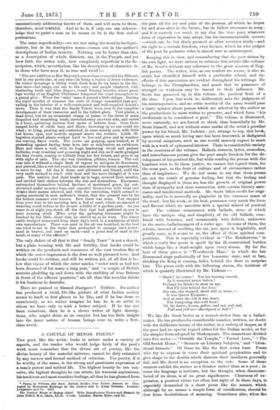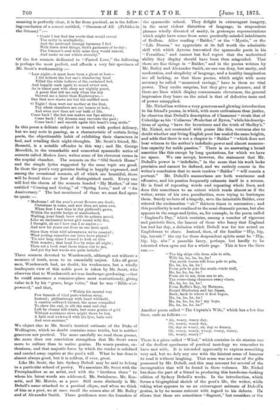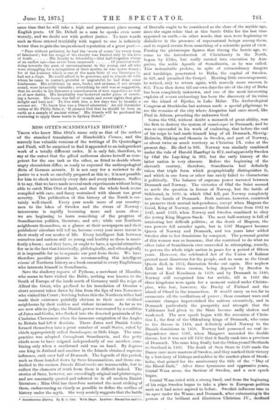A COUPLE OF MINOR POETS.* THE poet, like the artist,
looks at nature under a variety of aspects, and the reader who would judge fairly of the poet's work must remember that the divine art of poetry, like the divine beauty of the material universe, cannot be duly estimated by any narrow and formal method of criticism. For poetry, if it be worthy of the name, is the strong and passionate expression of a man's purest and noblest life. The highest beauty he can con- ceive, the highest thoughts he can attain, his warmest aspirations, his tenderest and most sensitive feelings, all that he has gleaned from
• Poems, by William Bell Scott ; Ballads. Studies from Nature, Sonnets, et-e Ilitte- trated by Seventeen Etchings by the Author and L. Allan Tadlema. London : Longmane and Co. 1875.
The Poetical Works of Sydney Dobell. With Introductory Notice and Memoir by John Nichol, MA. Oxon, LL.D. 2 rob. London: Smith, Elder, sad Oa
the past, all the joy and pain of the present, all which he hopes for and aims after in the future, has its fullest utterance in song ; and it is scarcely too much to say that the true poet, whatever form of expression he may adopt, has his incommunicable secrets —which can be but dimly guessed at after reverent study—and his right to a certain freedom, even licence, which he who judges of the poet by pedantic rules is almost sure to misinterpret.
Keeping this in view, and remembering that the poet shines by his own light, we have striven to estimate this artistic-like volume of Mr. Scott's without any reference to the great masters of Eng- lish poetry. The writer, who, as our readers are aware, is also an artist, has identified himself with a particular school, and the effects of this association are evident throughout his writings. He belongs to the Preraphaelites, and much that he possesses of strength or weakness may be traced to their influence. Mr. Scott has garnered up in this volume the poetical fruit of a life-time. Upon this work he deliberately asks the judgment of his contemporaries, and no critic worthy of the name would pass a hasty opinion about poems which are selected by the author as the productions he most wishes to preserve, and which form "his. credentials to be considered a poet." The volume is illustrated, more curiously, we are forced to think, than beautifully by Mr. Scott himself, and not without some marks of the artist's peculiar power by his friend, Mr. Tadema ; yet, strange to say, this book,. upon which so much loving care has been bestowed, is disfigured by several misprints, such as one would scarcely expect to meet with in a work of ephemeral interest. There is considerable variety in the contents of the volume. Ballads, sonnets, lyrics, monodies,. and miscellaneous poems give the poet ample freedom for the de- velopment of his poetical life, but while reading the poems with the heartiest wish to do them justice, we cannot but regard them, for the most part, as the fruit of culture and of circumstance rather than of inspiration. We do not mean to say that these poems. are not the result of genuine feeling, but that the feeling and thought displayed in them are less the growth of original power than of sympathy and close connection with certain literary asso- ciates and intellectual methods. Mr. Scott takes credit for origi- nality, and he is assuredly no plagiarist in the common sense of the word; but his work, at his best, possesses very much the form and flavour which we associate with a special school of poetical art. The volume commences with ballads, some of which have the antique ring and simplicity of the old ballads, com- bined with beauties, and occasionally with defects, unknown to the metre-balladmongers of a ruder age. In some of them, the refrain, instead of soothing the ear, jars upon it frightfully, and greatly mars, as it seems to us, the effect of these spirited com- positions. This is especially evident in "The Rendezvous," in which a really fine poem is spoilt by the ill-constructed burden, which hangs like a dead-weight upon every stanza. By far the best of these pieces is "Woodstock Maze," in which the fair Rosamond sings pathetically of her lonesome state, and at last, thinking the King is coming, hides behind the door to surprise him. The poem ends with the following stanza, the incident of which is quaintly illustrated by Mr. Tadema :— " 'Hark ! he comes ! Yet his footstep sounds
As it sounded never before I Perhaps he thinks to steal on me, But I'll hide behind the door.'
She ran, she stopped, stood still as stone.—
It was Queen Elaiinore ; And at once she felt it was death The hungering she-wolf bore !
Oh, the leaves, brown, yellow, and red, still fall, Fall and fall over churchyard or hell!"
We like Mr. Scott better as a sonnet-writer than as a ballad- maker. He has produced a considerable number, written, no doubt with the deliberate intent of the writer, in a variety of shapes, as if the poet had no special regard either for the Italian model, or for the simpler form adopted by Shakespeare. The sonnetsare divided. into five series :—" Outside the Temple," "Parted Love," "The Old Scotch Home," "Sonnets on Literary Subjects," and "Occa- sional Sonnets." Of these we like the first series least. Poets who try to express in verse their spiritual perplexities and to give shape to the doubts which distress their intellects generally fail, and Mr. Scott is no exception to the rule. Some of these sonnets exhibit the author as a thinker rather than as a poet ; in some the language is intricate, but the thought, when disencum- bered of its dress, is of no great significance. Clearness of ex- pression, a poetical virtue too often lost sight of in these days, is especially demanded in a short poem like the sonnet, which although by no means a simple form of versification, should be free from doubtfulness of meaning. Sometimes also, when the
meaning is perfectly clear, it is far from poetical, as is the follow- ing conclusion of a sonnet entitled, "Oneness of All. (Pebbles in the Stream) " :—
"Could I but find the words that would reveal The unity in multiplicity,
And the profound strange harmony I feel With these dead things, God's garments of to-day ; The listener's soul -with mine they would anneal, And make us one within eternity."
Of the few sonnets dedicated to "Parted Love," the following is perhaps the most perfect, and affords a very fair specimen of Mr. Scott's workmanship :—
"Last night—it must have been a ghost at best— I did believe the lost one's slumbering head Filled the white hollows of the curtained bed,
And happily sank again to sound sweet rest,
As in times past with sleep my nightly guest, A guest that left me only when the day Showed me a fairer than Euphrosyne,—
Day that now shows me but the unfilled nest.
0 Night ! thou wert our mother at the first,
Thy silent chambers are our homes at last ; And even now thou art our bath of life.
Come back ! the hot sun makes our lips athirst ;
Come back ! thy dreams may recreate the past ; Come back! and smooth again this heart's long strife."
In this poem a delicate subject is treated with perfect delicacy, but we may note in passing, as a characteristic of certain living poets, the objectionable habit of exhibiting their characters in bed, and retailing their night-thoughts. Mr. Scott's friend, Mr. Rossetti, is a notable offender in this way, and Mr. George Meredith, in the remarkable and somewhat spasmodic series of -sonnets called Modern Love, writes some of his cleverest verses in the nuptial chamber. The sonnets on the "Old Scotch Home" and the simple lyrics suggested by the same topic are good. In these the poet's very genuine feeling is happily expressed, and -among the occasional sonnets, all of which are beautiful, there will be found three or four of distinguished merit. Every one will feel the charm of the sonnets headed "My Mother," of one entitled "Coming and Going," of "Spring Love," and of "An Anniversary." The last mentioned of these we must find space to quote .—
"Madonna! all the year's sweet flowers are dead ;
Christmas is come, and now thou art mine own.
When first I saw thee in thy girlhood's gown, Within the myrtle hedge of maidenhood, Waiting, your frank brow with its auburn snood, Like an enchanted tower girt round with fire, I thought, ah me ! how can I so aspire ;- And now for years our lives as one have sped.
Since then what wild adventures we've essayed ; What jesting comedies our fates have played ! 'Tis now long since I ceased to look on thee With wonder; that head lies by mine all night ; Thou art a book road three times o'er to me, And yet thy last words are quite infinite."
Three sonnets devoted to Wordsworth, although not without a measure of truth, seem to us essentially unjust. Like all great men, Wordsworth had, no doubt, his weaknesses, but a wholly inadequate view of this noble poet is taken by Mr. Scott, who observes that to 1Vordsworth art was landscape-gardening,—that he could announce a common-place most sententiously, giving value to it by his "grave, large voice," that he was "Bible o'er- powered," and that,
"Within his mental way Few threads of vital poet-wisdom stray. Instead; philanthropy with hand withheld, A caution selfward turned, the muse compelled To chew the cud, to sift the sand and clay Left by chance hill-winds, lest some grains of gold Without assiduous sieve might there be lost. A bald soul awkward with his lyre, both cold And over-anxious."
We object also to Mr. Scott's ironical estimate of the Duke of Wellington, which no doubt contains some truths, but is neither generous nor poetical. The more carefully we read these poems, the more does our conviction strengthen that Mr. Scott owes more to culture than to native genius. He wants passion, en- thusiasm, and that majestic force by which the reader is subdued and carried away captive at the poet's will. What he has done is almost always good, but it is seldom, if ever, great.
Like Mr. Scott, the late Sydney Dobell may be said to belong to a particular school of poetry. We associate Mr. Scott with the Preraphaelites as an artist, and with the "brethren three" to whom his latest words are addressed, Mr. Swinburne, Mr. Ros- setti, and Mr. Morris, as a poet. Still more distinctly is Mr. Dobell's name attached to a poetical clique, and when we think of him as a poet, we at once recall the names also of Mr. Bailey and of Alexander Smith. These gentlemen were the founders of
the spasmodic schooL They delight in extravagant imagery, in the most violent distortion of language, in stupendous phrases wholly divested of sanity, in grotesque representations which might have come from some poetically-minded inhabitants of Bedlam. After reading "Balder," or the "Mystic," or the "Life Drama," we appreciate at its full worth the admirable skill with which Aytoun travestied the spasmodic poets in his " Fermilian," and cannot but feel regret that the undoubted ability they display should have been thus misguided. That there are fine things in "Balder," and in the poems written by Mr. Bailey and Alexander Smith, no one can deny, but sanity, and moderation, and simplicity of language, and a healthy imagination are all lacking, so that these poems, which might with more accuracy be called "measured ravings," have in them no vital power. They excite surprise, but they give no pleasure, and if there are lines which display consummate cleverness, the general impression they leave on the mind is that of defective taste and of power misapplied.
Mr. Nichol has written a very generous and glowing introduction to his friend's poems, in which, with more enthusiasm than justice, he observes that Dobell's description of Chamouni "rivals that of Coleridge as his Coliseum ' Ayala that of Byron," while his descrip- tions of spring "have the luxuriance and the truth of Shelley's." Mr. Nichol, not contented with praise like this, ventures also to doubt whether any living English poet has scaled the same heights, and adds that there is not a chapter in "Balder" "which does not bear witness to the author's indefinite power and almost measure- less capacity for noble passion." There is no answering a broad assertion like this except by long quotations, for which we have no space. We can accept, however, the statement that Mr. Dobell's power is "indefinite," in the sense that his work lacks precision and cannot be defined, and we entirely concur in the writer's conclusion that to most readers "Balder" "will remain a portent." Mr. Dobell's mannerisms are both wearisome and offensive, and his passion frequently exhausts itself in a scream. He is fond of repeating words and repeating whole lines, and does this sometimes to an extent which reads almost as if the writer, aware of his own peculiarities, were trying to burlesque them. Surely no hero of a tragedy, save the inimitable Balder, ever uttered the exclamation " ah !" thirteen times in succession ; and this peculiarity is not confined to the semi-dramatic poems, but also appears in the songs and lyrics, as, for example, in the poem called England's Day," which contains, among a number of vigorous and patriotic lines, the lament of those who fancy that England has had her day, a delusion which Dobell was far too sound an Englishman to share. Instead, then, of the familiar "hip, hip, hip, hurrah !" the cry for these despondent spirits must be "Hip, hip, hip, aha!" a passable fancy, perhaps, but hardly to be tolerated when spun out for a whole page. This is how the lines run :—
‘. The big ships ride from side to side,
With ha, ha, ha, ha, ha!
The north waves roll from pole to pole, Ha, ha, ha, ha, ha !
From pole to polo the south-winds troll, Ha, ha, ha, ha, ha !
From air to sea, from sea to air, The cross-clang clamours every where, Ha, ha, ha. ha, ha!
From Baffin's Bay, by Matapan, Round Hindostan and far Japan, Back, back to where it first began, Ha, ha, ha, ha, ha!
Ha, ha, ha, ha, ha! my boys, Ha, ha, ha, ha, ha I"
Another poem called "The Captain's Wife," which has a few fine lines, ends as follows
Ah, weary, weary day, Oh, weary, weary day, Oh, day so weary, oh, day so dreary, Oh, weary, weary, weary, weary, weary, Oh, weary, weary !"
There is a piece called "Wind," which contains in six stanzas one of the drollest specimens of poetical tautology we remember to have met with. It is intended apparently to express something very sad, but we defy any one with the faintest sense of humour to read it without laughing. That sense was not one of the gifts possessed by Mr. Dobell, and this may account for several of the incongruities that will be found in these volumes. Mr. Nichol has done the part of a friend in producing this handsome-looking edition of Sydney Dobell's works. In the introduction, which forms a biographical sketch of the poet's life, the writer, while taking what appears to us an extravagant estimate of Dobell's genius, is by no means reticent with regard to his defects. He allows that these are sometimes "flagrant," but considers at the .same time that he will take a high and permanent place among English poets. Of Mr. Dobell as a man he speaks even more warmly, and we doubt not with perfect justice. To have words such as these uttered truthfully with regard to one is infinitely better than to gain the unquestioned reputation of a great poet :— ,
"Pure without pedantry, he had the scorn of scorn ' for every form of falsehood ; but the range of his charity was limited only by his love
of truth His loyalty to friendship—that half-forgotten virtue of an earlier age—has never been surpassed Of practical well-
doing towards the poor, of encouragement to the young. and all who were struggling for a recognition of their merits, he was never weary ; for of the jealousy which is one of the main blots of our literature he had not a tinge. He could afford to be generous, and to almost all with whom he came in contact, grateful or ungrateful, he had done some , kindnesses. His criticisms on men, books, and systems, if not always sound, were invariably valuable ; everything he said was so suggestive, that he awoke in his listeners a consciousness of new capacities as well as of new duties. His hospitality was bestowed under guise of receiv- ing a favour. His house was full of 'sounds and sweet sights that give delight and hurt not.' To live with him a few days was to breathe a serener air. 'To know him was a liberal education.' An old chronicler , writes of Sir Philip Sidney, 'It pleased God that he should be born on ,earth as a sample of ancient virtue.' His friends will be pardoned for 'venturing to apply these words to Sydney Dobell."




































 Previous page
Previous page